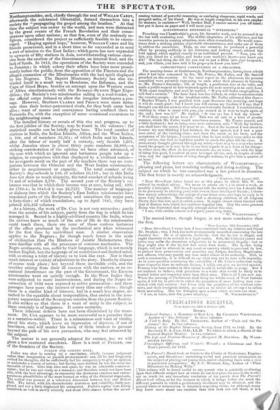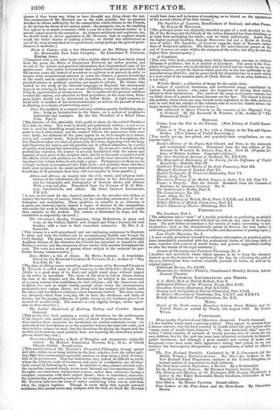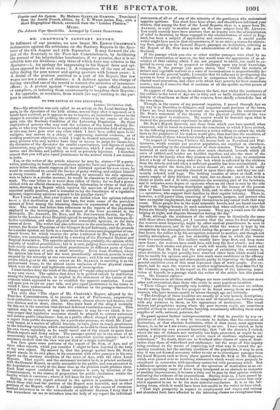PUBLICATIONS RECEIVED,
From September 30th to October 13th,
Richard Savage; a Romance of Real Life. By Ctiant.Es WHITEHEAD, Author of" The Solitary." In three volumes.
A Visit to Italy. By Mrs. TROLLOPE, Author of "Paris and the Pa- risians," 8,:c. In two volumes.
History of the Baptist Missionary Society, from 1792 to 1842. By the Reverend F. A. Cox, D.D., LL.D. To which is added, a Sketch of the General Baptist Mission. In two volumes.
The Life and Poetical Remains of Margaret AL Davidson. By WASH- INGTON IRVING.
Friendship's Offering, and Winter's Wreath ; a Christmas and New Year's present, for 1843.
The Parent's Hand-book, or Guide to the Choice of Professions, Employ- ments, and Situations : containing useful and practical information on the subject of placing out young men, and of educating them with a view to particular occupations. By J. C. Huns" Esq., Author of "Plain Directions for Making Wills." [This volume will be found useful to any parent who is painfully meditating upon that difficult subject how or where he can hest place his sons in the world ; not so much for any immediate resolution of his puzzle that The Parent's .Hand-booh offers, as for the manner in which it brings before the mind -the different pursuits in which a gentlemanly livelihood may be obtained, and the general hints or information it furnishes respecting them ; for although many may know more about one vocation than this book can tell them, it is a chance if they know any thing or have thought any thing about the reef. The conclusions of Mr. HUDSON are in the main sensible; but we question whether he allows sufficiently for the competition which obtains in the Church, in the picture he draws of its various prizes: the prospects, too, in the teaching line appear to us much overrated-5001. a year for a first classical master in a private school must be the exception. As respects architects and engineers, too, we should hold, in direct opposition to Mr. HonsoN, that an engineer stands much the better chance of making a living : we should rate architecture as one of the most overstocked of the professions, except perhaps the general pract- itioners in medicine.] Hints to Cadets; with a few Observations on the Military Service of the Honourable East India Company. By Lieutenant T. POST ANS, Bombay Army.
[Compared with a few other books with a similar object that have lately issued from the press, the Hints of Lieutenant POSTANS are rather general, and devoid of the minute and practical information that characterized some of his predecessors. Our author recommends that cadets should not proceed to India till twenty years old, instead of seventeen or eighteen as at present, in order to acquire more constitutional stamina to resist the climate, a greater knowledge of the world, and be enabled to lay the foundation of some acquaintance with physical science or political economy not taught in schools. He thinks time wasted on the study of the Oriental languages in England, but strenuously urges it on arriving in India, as a means of fulfilling every-day duties, and pro- fiting by opportunities of advancement. He recommends the greatest mildness towards the natives, and attention to their prejudices; at the same time, Euro- pean habits should not be abandoned to follow theirs. A rigid economy to avoid debt is another of his recommendations; as well as the pursuit of music or drawing, as a means of preventing ennui.] Chess Exemplified, in a concise and easy notation greatly facilitating prac- tice: being an Introduction to the Game, on a system of progressive instruction and examples. By the late President of a Select Chess Club. Part I.
[The features of this admirable little guide to chess, by the retired President of a club, are three. The work is clearly and judiciously written ; a new nota- tion is used for describing actual moves, by which means the description of a game is much abbreviated, and the student follows the manseuvres with more ease; lastly, the elements of the game appear to us to be taught in a clearer, easier, and Founder mode. Instead of giving general rules or descriptions, the late President takes one class of pieces only at a time, beginning with the king, and illustrates his moves, and his peculiar use in critical situations, by a series of readily-understood but interesting examples. By means of a variety of such preliminary exercises, the learner is not only familiarized with the nature and -capacity of each piece in the simplest form, but he is also made acquainted with the effects which each produces on the result, and the best occasions for bring- ing,them into action, before he attempts a game. To beginners in chess we are strongly inclined to recommend this little book ; and probably those who have made some progress in the usual method of learning will gain more systematic knowledge of its principles than they will ever acquire by mere practice.]
Attica and Athens; an inquiry into the civil, moral, and religious insti- tutions of the inhabitants, the rise and decline of the Athenian power, and the topography and choregraphy of Ancient Attica and Athens. With a map and AM. Translated from the German of K. 0. WIL- LER, GROTEFEND, and others. By JOHN INGRAM LOCKHART, F.R.A.S.
[A very useful work for the classical student, or the traveller who wishes to explore the territory of ancient Attica, for the exceeding minuteness of its in- formation and description. These qualities, so valuable in an itinerary or guide, are, however, apt to impart a degree of dryness to the composition, and render the work in which they prevail less attractive to the general reader than valuable to the student. The volume is illustrated by maps, and the translation is respectably executed.] The Christian's Sunday Companion; being Reflections, in prose and verse, on the Collect, Epistle and Gospel, and Proper Lessons for each Sunday, with a view to their immediate connexion. By Mrs. J. A. SARGANT.
iThis volume is a well-intentioned and not unpleasing endeavour to illustrate in prose and verse the Collect and its accompanying Epistle and Gospel for every Sunday. The prose consists of an explanation, drawn from the principal Anglican divines, of the character the Church has intended to impart to each 'Sunday's service, and the connexion of one service with another throughout the year. The verse is a series of poems, whose subject is the occasion the par- ticular Sunday commemorates..] Dora Melder ; a tale of Alsace. By META SANDER. A translation. Edited by the Reverend CHARLES B. TAYLER, M.A., Author of "May You Like It," &c.
[The plan of editing seems extending, and the name of the Reverend CHARLES B. TAYLER is called upon to give currency to this little tale; though Dora Milder is a good story of its kind, and might stand alone without respect to its writer or translator. The scene of the story is laid in Alsace, during the time of the Empire and the Restoration; its subject is the conversion of a youeg woman from worldliness to vital religion ; and the characters and incidents are such as might readily enough occur under the circumstances predicated—two orphan sisters, one living with her mother's rich family, and the other with her father's relations, whose means are limited. The story seems too obviously taken from everyday life to have the wholeness and unity of fiction; but the passing influence of public events on the incidents gives it an interest of another kind. The manner is only slightly foreign, rather agree- ably so than otherwise.] The Ladies' Hand-book of Knitting, Netting, and Crotchet. Second thousand.
[This pretty tiny book contains a variety of directions for the performance of the elegant and useful lady-like arts of which it professes to treat. With what success these mysteries are inculcated, we cannot undertake to say: we understand the descriptions as to the countries whence the materials come, and their relative values—as wool ; but the directions for plying the fingers and the needles are beyond us, most probably from not knowing the elementary princi- ples on which they rest.] Proverbial Philosophy; a Book of Thoughts and Arguments, originally treated. By MARTIN FARQUHAR TUPPER, Req., M.A., of Christ Church, Oxford. Second series.
[This second series of Mr. TUPPER'S Proverbial Philosophy, though quaint and able, strikes us as being inferior to the first; whether from the rather pall- ing effect that continuations generally produce, or from being a kind of imita- tion of its predecessor. This last mannerism may indeed be difficult to avoid, where the subjects, mode of treatment, and style of versification are all iden- tical, except by forbearing the task. In addition to these almost inherent evils, the execution, scanned closely, seems more laboured and less spontaneous The thoughts are sometimes independent axioms, rather than sentences having a complete connexion with their subject theme: there is sometimes, moreover, the substitution of sounding sentences for weighty thoughts, and occasionally Mr. TUPPER falls into the error of rather considering what can be said than what the subject requires. Though in every thing that regards outward semblance this second series may compare with the first, we think Mr. TUPPER
would have done well to beware of overdoing, as we hinted on the appearance of the second edition of his first volume.] - The Sepulchre of Lazarus, Recollections of Scotland, and other Poems, By SARAH H. MouvroN. [The principal poem was originally intended as part of a work devoted to the life of the Saviour, but the friends of the writer dissuaded her from finishing, or at least from publishing the whole; and we think judticiously. Apart from the higher poetical faculties, SARAH MOULTON has not a Syriac or Jewish tone of mind : The Sepulchre of Lazarus suggests ideas of Byronic, rather than of Scriptural subjects. The themes of the miscellaneous poems at the end of Lazarus are more within the compass of the writer, but they do not rise higher than Annual poetry.] A Complaint.
[This very little hook, containing some thirty Spenserian stanzas, is without titlepage or publisher, but it is printed at Liverpool. The poem is the Com- plaint of a gentleman who is dissatisfied with himself and the world, for no very definite reasons, except the distress which gave rise to the late outbreaks in the manufacturing districts; and he pours forth his dissatisfaction in a style which is a mere echo of the moodier parts of Childe Harold. As an echo, however, it is not bad.]
Whistle-Blade; a collection of Songs for the social circle. [A volume of convivial, humorous, and sentimental songs, contributed by various Scottish lyrists; who enjoy the happiness of having their names affixed to their lucubrations. The merit of the songs is of course various, but we think those of a quaint national humour are the beat. The idea of a lyrical olla-podrida where every one may furnish some ingredient to the dish, seems to
take so well the smaller of the volumes sent to us is the fourth series; the larger contains the whole four seri. s in one.]
Ode addressed to Queen Victoria on the occasion of her Majesty's Visit to Scotland. By the Reverend R. Wu.soN, A.M., Author of "The Pleasures of Piety."
SERIALS.
Cotton, from the Pod to the Factory. (New Library of Useful Know- ledge.) China, as it Was and as it Is; with a Glance at the Tea and Opium Trades. (New Library of Useful Knowledge.) [Two neatly got-up, low-priced, and popularly-done compilations, on two popular topics.] Ranke's History of the Popes, their Church and State, in the sixteenth and seventeenth centuries. Translated from the last edition of the
German by WALTER K. KELLY, Esq., B.A. Part IL (Popular Li-
brary of Modern Authors. Copyright editions.) The New Statistical Account of Scotland, No. XXXIX.
The Biographical Dictionary of the Society for the Diffusion of Useful Knowledge; Monthly Part I'V. Carletmes Traits and Stories of the Irish Peasantry, Part III. Murray's Environs of London, Part VI.
Doyle's Cyclopedia of Practical Husbandry, Part VL Handy Andy, Part X.
Thornton's History of the British Empire in India, Vol. III. Part VL Faust ; a Tragedy. Part the Second. Rendered from the German of GOETHE, by ARCHER GURNEY. No. V. The Gaberlunzie's Wallet, Part X.
The Commissioner, No. XL Combe Abbey, No. VI.
Yarrelts History of British Birds, Parts XXXH. and XXXIIL Selby's History of _British Forest-trees, Part XL Smee's Elements of Electro-Metallurgy, Part VI.
PERIODICALS.
[The collection into a " part " of a weekly periodical on gardening, so printed that the volume when completed will bind up without any signs of its weekly issue. The part before us contains a fair variety of topics interesting to hor- ticulturists; such as the characteristic points of flowers, the best modes of cultivating particular plants, notices of books, and discussions of passing topics.] Law Clerk's Magazine, No. I.
[A new weekly periodical, intended to embrace information on practical points more immediately connected with the professional duties of this large body of men; together with reviews of useful books, and general suggestions tending to raise the morale of the legal assistants.] Annals of Chemistry and Practical Pharmacy, No. I. [Another new periodical, whose object appears to be to keep the chemical student up to the discoveries or opinions of the day, by collecting the pith of the new information from various scientific journals or books, as well as by original papers.] • Edinburgh Review, No. CLIIL Magazznesfor October—Fraser's, Churchman's Monthly Review, Asiatic Journal, 'Chemist.
PICTORIAL ILLUSTRATIONS AND PRINTS.
S. C. Halts Book of British Ballads, Part V. Abbotsford Edition of the TVaverley Novels, Part XIII. Canadian Scenery Illustrated, Part XXVIII.
Scenery and Antiquities of Ireland Illustrated, Part XVII. Le Keux's Memorials of 'Cambridge, Nos. XXXV. and XXXVL British Moths and their Transformations, No. XIL MAPS.
Sketch of the North-eastern Boundary between Great Britain and the United States, as settled by Treaty, 9th August 1842. By JAMES WILD.
PA MPIILETS.
Homeeopathy Explained and Objections Answered. Fourth thousand. [A. few familiar words upon a growing subject. They appear to proceed from a sincere convert, who has been restored to health under the new system after "many years of unalleviated sickness." "My own household also," says the writer, "which consists of upwards of twenty persons, nine of whom are my own children, has for the past ten years been subjected exclusively to homeo- pathic treatment ; and although a great number and variety of acute and dangerous cases have made their appearance during that period, in no one instance has homoeopathy disappointed my expectations, or failed to effect a cure."] The New Zealand Portfolio. Conducted by H. L. Caseate's, (of the Middle Temple,) Barrister-at-Law. No. 111.—An Address to the New Zealand Land Proprietors, resident in the United Kingdom, on several matters of importance to their interests. The Oral Law and its 'defenders ; a Review. By a Scripturalist. On the Economy of Nations. By THOMAS SHARPE SMITH, Esq. The History and Mystery of the Exchequer Bills Forgery Examined; Letter to the Right Honourable Henry Goulburn, Chancellor of her Majesty's Exchequer.
Gas-Meters. By HENRY FLOWER. Second edition. Four Letters on the Poor-Laws and the Corn-Laws. By 13.immoo STONE.
The Gardener, Part I. Fourier and his System. By Madame Garr' DE Gasman. Translated from the fourth French edition, by C. T. WOOD junior, Beg., with a short Biographical Sketch, extracted from the "London Phalanx."
Music.
The Johnnie Cope Quadrilles. Arranged by CARLE SLIEPINSKI.




























 Previous page
Previous page